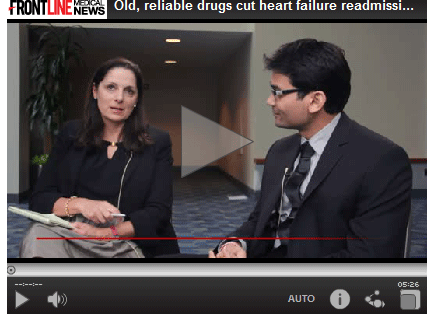User login
WASHINGTON, D.C. – Heart failure patients discharged on inexpensive, guideline-recommended drugs were half as likely to be readmitted for the condition within* 30 days, compared with those who weren’t given the drugs, according to a study of the Alabama Heart Failure Project that used Medicare data.
Dr. Kumar Sanam, an advanced heart failure fellow at the University of Alabama, Birmingham, presented the study at the annual meeting of the American College of Cardiology, and sat down with us to discuss the take-home implications of the study.
*CORRECTION, 4/22/2014: An earlier version of this story misstated the follow-up period.
WASHINGTON, D.C. – Heart failure patients discharged on inexpensive, guideline-recommended drugs were half as likely to be readmitted for the condition within* 30 days, compared with those who weren’t given the drugs, according to a study of the Alabama Heart Failure Project that used Medicare data.
Dr. Kumar Sanam, an advanced heart failure fellow at the University of Alabama, Birmingham, presented the study at the annual meeting of the American College of Cardiology, and sat down with us to discuss the take-home implications of the study.
*CORRECTION, 4/22/2014: An earlier version of this story misstated the follow-up period.
WASHINGTON, D.C. – Heart failure patients discharged on inexpensive, guideline-recommended drugs were half as likely to be readmitted for the condition within* 30 days, compared with those who weren’t given the drugs, according to a study of the Alabama Heart Failure Project that used Medicare data.
Dr. Kumar Sanam, an advanced heart failure fellow at the University of Alabama, Birmingham, presented the study at the annual meeting of the American College of Cardiology, and sat down with us to discuss the take-home implications of the study.
*CORRECTION, 4/22/2014: An earlier version of this story misstated the follow-up period.
At ACC 14
